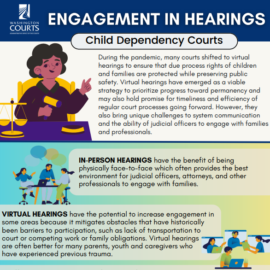Early engagement of parents in dependency cases is important for successful reunification, however, parents often feel blame and shame as they deal with the trauma of removal and find it difficult to trust those working in the child welfare system. Some of you are aware of Parents for Parents (P4P), which is an early engagement and education program for parents involved in the child welfare system. However, some of you may not be aware, and we want to let you know more about this program, as it will be expanded statewide by the end of June 2021.
How does P4P help parents?
- Parents for Parents is a peer outreach and education program provided by parents who have successfully navigated the child welfare system to parents who have recently become engaged with the dependency system.
- Through court outreach at dependency hearings, a Dependency 101 class designed to educate parents about the dependency system, and ongoing peer mentoring, P4P helps encourage positive thinking and engagement with services, gives parents someone they can relate to, and offers them hope that reunification is possible.
- The Parents for Parents program supports safe and timely reunification of children with their parents, or an alternative permanency outcome when reunification is not a viable goal and supports the preservation of families with in-home dependency cases.
How do we know it works?
The most recent P4P program evaluation, Parents for Parents Phase II Evaluation, was published in 2020 and provides supporting data for the overall findings that suggest a positive relationship between P4P and parental engagement and case outcomes. Here are a few findings listed in the evaluation:
Parent Engagement
- A positive relationship between Dependency 101 attendance and service compliance at the first review hearing and permanency planning hearing for mothers and fathers.
- A positive relationship between Dependency 101 attendance and visitation compliance at review and permanency planning hearings for mothers; a relationship between Dependency 101 and visitation compliance at the permanency planning hearing for fathers.
Case Outcomes
- A relationship between parent participation in Dependency 101 and increased reunification rates.
- 70% of parents who participated in Dependency 101 reunified with their children.
- 53% of parents who did not participate in Dependency 101 reunified with their children.
- A relationship between parent participation in Dependency 101 decreased TPR rates.
- 26% of parents who participated in Dependency 101 had their parental rights terminated.
- 39% of parents who did not participate in Dependency 101 had their parental rights terminated.
- And what happened when parents received additional mentoring from Parent Allies?
- 79% of parents who participated in Dependency 101 and received additional mentoring reunified with their children.
How is P4P funded?
During the 2015 state legislative session, the Legislature recognized the benefits of P4P and legislation was passed which provided funding to existing P4P programs, funding to expand three of the programs, and funding for an evaluation to determine if the program can be considered research-based. The legislation placed the P4P program under the direction of the Office of Public Defense, who contracts with the Children’s Home Society of Washington to provide oversight and coordination for the statewide programs. Two years later, additional funding was allocated by the Legislature to support four additional P4P programs in the state and to allow for expansion of additional county sites. In 2019, the Legislature provided more funding, with the ultimate goal of operating the P4P program statewide by the end of the 19-21 biennium.
When will P4P come to my county, and what can I do to help?
If you don’t currently have P4P in your county, you may be interested in the following documents, CHSW Parents for Parents Replication Process and P4P Startup Info Sheet – Statewide, which provide information regarding the process and how the court is involved. RFQs will be distributed to all counties who do not currently have P4P. You can start working on the process now by considering the following:
- Determine whether the court will be the host agency for the program, or if a community agency would be willing to host the program. Either way, court support is essential for a successful P4P program.
- Provide information to Children’s Home Society of Washington regarding your dependency court calendar and hearings that you expect parents will be attending. This will assist with determining appropriate staffing levels.
- Who in your court is the best contact person regarding P4P implementation?
- Do you have a dependency stakeholder group (attorneys, etc.) that currently get together, where the program can be presented?
If you have any questions, please contact Kelly Warner-King, Senior Court Program Analyst, at: Kelly.Warner-King@courts.wa.gov
For more information about P4P please contact the Parent Allies at Children’s Home Society of Washington:
For assistance with Washington State programs, contact Ambrosia Eberhardt, statewide family impact manager at Children’s Home Society of Washington: Ambrosia.Eberhardt@chs-wa.org
For jurisdictions outside of Washington State and Tribes, contact Heather Cantamessa, national family impact program manager at Children’s Home Society of Washington: heather.cantamessa@chs-wa.org
For information about the overall P4P program, contact Heather Cantamessa, director of family impact at Children’s Home Society of Washington: Heather.Cantamessa@chs-wa.org





